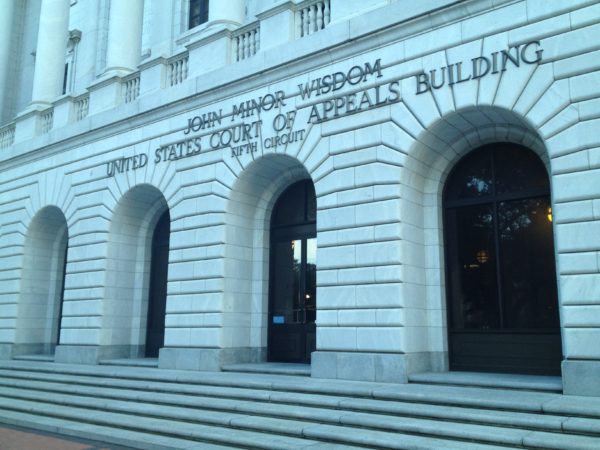
- Details
- By Native News Online Staff
Oral Arguments Made in Brackeen v. Bernhardt Case in U.S. Fifth Circuit Court of Appeals
NEW ORLEANS — Leaders of national American Indian organizations were in the courtroom of the U.S. Fifth Circuit Court of Appeals on Wednesday to hear oral arguments defending the Indian Child Welfare Act in the Brackeen v. Bernhardt case.
They left the New Orleans courtroom feeling confident the 41-year old Indian Child Welfare Act (ICWA) will be upheld.
“We look forward to the Fifth Circuit Court of Appeals’ decision,” said Sarah Kastelic, executive director of the National Indian Child Welfare Association, in a news release from the Protect ICWA Campaign. “We are confident the Fifth Circuit will affirm ICWA’s strong constitutional grounding. ICWA protects children in state child welfare systems and helps them remain connected to their families, cultures, and communities.”
The Protect ICWA Campaign is comprised of the following four national American Indian organizations: National Indian Child Welfare Association (NICWA), National Congress of American Indians (NCAI), Association on American Affairs (AAIA), and the Native American Rights Fund (NARF).
“Today, before an en banc panel of the United States 5th Circuit Court of Appeals, Indian Country advocated a strong and compelling argument that the Indian Child Welfare Act is not only constitutional, but serves the best interests of American Indian children,” NCAI Chief Executive Officer Kevin Allis commented to Native News Online. “ICWA has been successful in reversing the unacceptable removal of American Indian children from tribal families and communities, ensuring that our culture, customs and traditions continue to endure.”
 Oral arguments were heard on Tuesday were held at the U.S. Circuit Court of Appeals in New Orleans. Courtesy photo
Oral arguments were heard on Tuesday were held at the U.S. Circuit Court of Appeals in New Orleans. Courtesy photo
“We are confident the full Fifth Circuit Court of Appeals will again confirm the constitutionality of the Indian Child Welfare Act,” said John Echohawk, executive director of the NARF. “We will always stand with our children, families, and Tribes against any and all efforts to diminish our communities, well-being, and sovereignty.”
"There has been an overwhelming amount of resources coming forward to support the Indian Child Welfare Act,” said Shannon Keller O’Loughlin, executive director and attorney for the AAIA. “We should be spending our resources protecting Indian children and not fighting interest groups that seek to dismantle the government-to-government relationship between the United States and Tribes. The Fifth Circuit will be on the right side of history protecting Indian children, and by doing so strengthening the child welfare system for all children."
A nationwide coalition of 495 tribal nations, more than 60 Native organizations, 26 states and the District of Columbia, 77 members of Congress, 31 leading child welfare organizations, and Indian and constitutional law professors agree ICWA is vital to the well-being of Indian children and the stability and integrity of Indian families today.
To learn more about ICWA visit: nicwa.org/about-icwa/ or read the full text of the Indian Child Welfare Act.
The following briefs were filed at the U.S. Court of Appeals in the Fifth Circuit in Brackeen v. Bernhardt:
Defendants-Appellants Briefs
Tribal Intervenor Defendants Brief
Amicus Briefs Supporting ICWA
486 Tribes and 59 Indian Organizations Brief
26 States and District of Columbia Brief
Casey Family Programs and Child Welfare Organizations Brief
Administrative Law and Constitution Law Professors Brief
Professor Gregory Ablavsky Brief
Native American Women, Indian Tribes, and Organizations Brief
More Stories Like This
Native News Weekly (August 25, 2024): D.C. BriefsUS Presidents in Their Own Words Concerning American Indians
Native News Weekly (December 28, 2025): D.C. Briefs
Minnesota Lt. Gov. Flanagan Draws Right-Wing Backlash After Wearing Hijab in Solidarity With Somali Community
Haaland Meets with Southern New Mexico Law Enforcement on Public Safety Priorities
Help us defend tribal sovereignty.
At Native News Online, our mission is rooted in telling the stories that strengthen sovereignty and uplift Indigenous voices — not just at year’s end, but every single day.
Because of your generosity last year, we were able to keep our reporters on the ground in tribal communities, at national gatherings and in the halls of Congress — covering the issues that matter most to Indian Country: sovereignty, culture, education, health and economic opportunity.
That support sustained us through a tough year in 2025. Now, as we look to the year ahead, we need your help right now to ensure warrior journalism remains strong — reporting that defends tribal sovereignty, amplifies Native truth, and holds power accountable.
 The stakes couldn't be higher. Your support keeps Native voices heard, Native stories told and Native sovereignty defended.
The stakes couldn't be higher. Your support keeps Native voices heard, Native stories told and Native sovereignty defended.
Stand with Warrior Journalism today.
Levi Rickert (Potawatomi), Editor & Publisher

